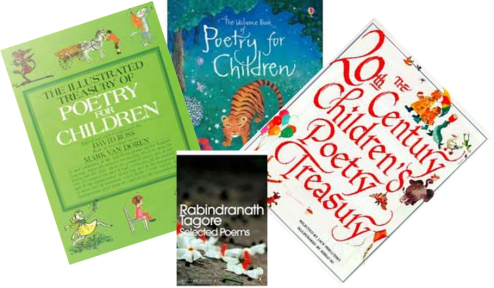“The terrace where I sit is screened
From the springtime dawn sunshine.
What a boon to have leisure –
No pressing tasks crowding in upon me yet;
No hordes of people pestering me,
Trampling over my time.
I sit and write:
The sweetness of a free morning collects in my pen-nib
Like the juice that drips from a slit in a date-palm…”
~ In the Eyes of a Peacock, Tagore
Beautiful poetry is always an inspiration. Whether it’s Tagore, Ralph Waldo Emerson, William Blake, Sarojini Naidu, Shakespeare, Emily Dickinson, R. L. Stevenson, Dr. Seuss, William Wordsworth, Ogden Nash, T.S. Eliot, Matsuo Basho, Charles Bukowski, Oscar Wilde, Rudyard Kipling, Gulzaar, the list is endless. Poets and their poetry have always inspired each one of us at every stage of our life. Whether they were nursery rhymes in preschool or those that we have been reading and singing along. They remind you of a forgotten life, a picture perfect day, ignored flowers that line the streets like confetti, that one moment that redefined your life.
Poems weave magic with simple words, phrases and vivid imagery. Babies are absolute naturals with poetry, with catchy, rhyming words, repetitive sounds and imagery. They not only enjoy the fun with words but learn to expand their vocabulary with them.
Poetry is not too popular with kids as they grow up because poetry loses out to the excessive emphasis on prose and essays. A poem usually appears after many stories in school text books. But if parents play an important role in exposing children to poetry from an early age, it can work wonders for their language and speech skills, understanding of rhyming lyricism, and the ‘art of minimalism’ – saying much with little, crossing miles with just a step!
So here is what you can do to initiate your children into poetry.
1. Look for age-appropriate poetry. This can help build an organic and natural interest in poems rather early.
2. Read poetry aloud so children can understand the pauses that define its continuity. Sing them to your child’s favourite tunes to make them memorable!
3. Translate poetry for your children in the mother tongue so they can appreciate the art behind the words and the soul behind its music.
4. Use the Figures of Speech such as Metaphors, Onomatapoeia, Alliterations, and Simile to explain more evolved poetry and convert reading time to game time as you ask them to identify the figures of speech in poems.
5. Read a variety of genres – from funny and silly to inspirational. Gradually you will understand what form of poetry your child has taken a liking to. You can then introduce them to poets from the genre of their liking.
6. Tell stories through narrative poems. From silly stories by Dr. Seuss to Robert Frost, H.W. Longfellow, William Wordsworth, Tagore and many others, there’s a wealth of such poetry out there.
Your interest in poetry will reflect on your child. So do not at any point refer to poetry as boring and disinteresting. With poetry, you are giving your child a paintbrush to unveil the artist within and a fistful of inspiration and whimsical poesy to hold on to forever.
“…For oft, when on my couch I lie
In vacant or in pensive mood,
They (daffodils) flash upon that inward eye
Which is the bliss of solitude;
And then my heart with pleasure fills,
And dances with the daffodils.
~ William Wordsworth”
Interesting links:
http://famouspoetsandpoems.com/
http://www.storyit.com/Classics/JustPoems/classicpoems.htm
http://www.pitara.com/talespin/poems.asp
Vaishali Shroff is a freelance writer and editor and runs a reading club (www.eikthirani.wordpress.com) for children in Pune. Her work has been published in over 10 titles of the Chicken Soup India Series, her children’s stories can be read at smories (http://www.smories.com/author/vaishali-shroff/) and she can’t wait for her first children’s book to be out.







Its true. Poetry inspires. One of the reason why people become indifferent to poetry from school/college days is that many a times too difficult poetry is selected for the syllabus; poetry to which students can not even remotely identify.
True, Nilesh. That’s where we step in – help kids identify with poetry that is appropriate for their age and take it from there. Open a window to a world where words dance, sing, and take you on a journey you don’t want to end! Thanks for reading 🙂
this is so important…
thanks from me and
my friends who will read it
Thank you, Nadi. And to your friends too. In school, for us, poetry meant painful “quote unquote” exercises. Mugging them up line by line with teachers threatening to cut marks if punctuation marks went missing. Like being force fed… I thank my mother for explaining verses and teaching the significance of poetry. I hope I can impart that to my son too! Thanks once again. 🙂